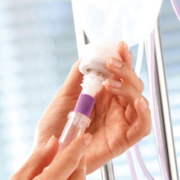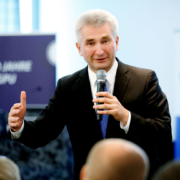PVC products provide vital help
For more than 60 years vinyl products have been successfully used in the healthcare sector and are indispensable to protect life. This is also evident in view of the current corona pandemic and is demonstrated by the wide range of medical applications, such as pharmaceutical blister trays for medicines, infusion tubes, blood bags, respiratory masks and tubing, tubing for extracorporeal membrane oxygenation of blood (ECMO), disposable protective gloves or other components of medical equipment.
The range of high-performance PVC products in the healthcare sector is wide and is constantly being expanded with new applications. About 40 percent of all medical plastic products in European hospitals are made of PVC. They improve the chances of recovery, extend life expectancy and enable the best standards of hygiene. PVC has achieved its widespread use in the healthcare sector not only because of its individually adaptable material properties, but also because of its attractive designs and low purchase and maintenance costs in times of tight budgets.
Core applications include flexible bag systems, for example. These include blood bags that can be easily sterilized and frozen. These soft foil bags extend the shelf life of blood up to 42 days and protect the red blood cells from hemolysis. Vinyl is also often the first choice for tubing systems for artificial ventilation, infusions, transfusions or flushing and suction processes via catheters, thanks to its good usage properties. The material proves to be very resistant to kinking and can withstand high mechanical stress without damage. Oxygen and anesthetic masks ensure survival in extreme situations. Thanks to the use of tiny tubes and moulded parts that offer impressive functionality in a minimum of space, minimal invasive surgery can now be performed. This protects the patient, reduces the risk and enables a much faster recovery than after major surgeries.
PVC products also have a firm place in building and construction applications in the healthcare sector. In addition to energy-saving PVC windows and solid, durable pipes, insulated cables and roofing membranes are used in many places. Stretched ceilings enable quick ceiling renovation without long downtimes and have a positive effect on room acoustics. Washable wallpaper and PVC profiles protect hospital corridors and patient rooms from dirt and damage caused by beds and handcarts. PVC sheets are installed as wall coverings because of their good hygienic properties and easy cleaning, but they are also convincing because they are impact-resistant, liquid-tight and quick to install.
Intensive care units, operating theatres and patient rooms are increasingly being fitted with vinyl floor coverings, which are proving to be extremely hard-wearing, stain-resistant and durable under the extreme stresses of daily use. They are also often used as orientation aids or for color-coded area marking in clinics. A significant advantage in terms of good hospital hygiene is the easy cleaning of the smooth surfaces. In addition to the facilitated control of spread germs and bacteria, this helps to increase patient safety and also reduces the maintenance costs, which can account for up to 92 percent of the total life cycle costs of the coverings: the right answer to the continuously increasing cost pressure in the health care sector without neglecting comprehensive hygiene. Thanks to their good sound absorption and anti-slip properties, the floorings also improve the working conditions of doctors and nursing staff who spend many hours a day in operating theatres or have to walk longer distances in hospitals. At the same time, they offer many modern designs that turn doctors‘ surgeries as well as patient rooms and canteens into feel-good rooms.
In order to support the circular economy and conserve valuable resources, various recycling systems for PVC applications in the healthcare sector are already available in Europe for years. In this way, the industry is making an important contribution to sustainable development.


